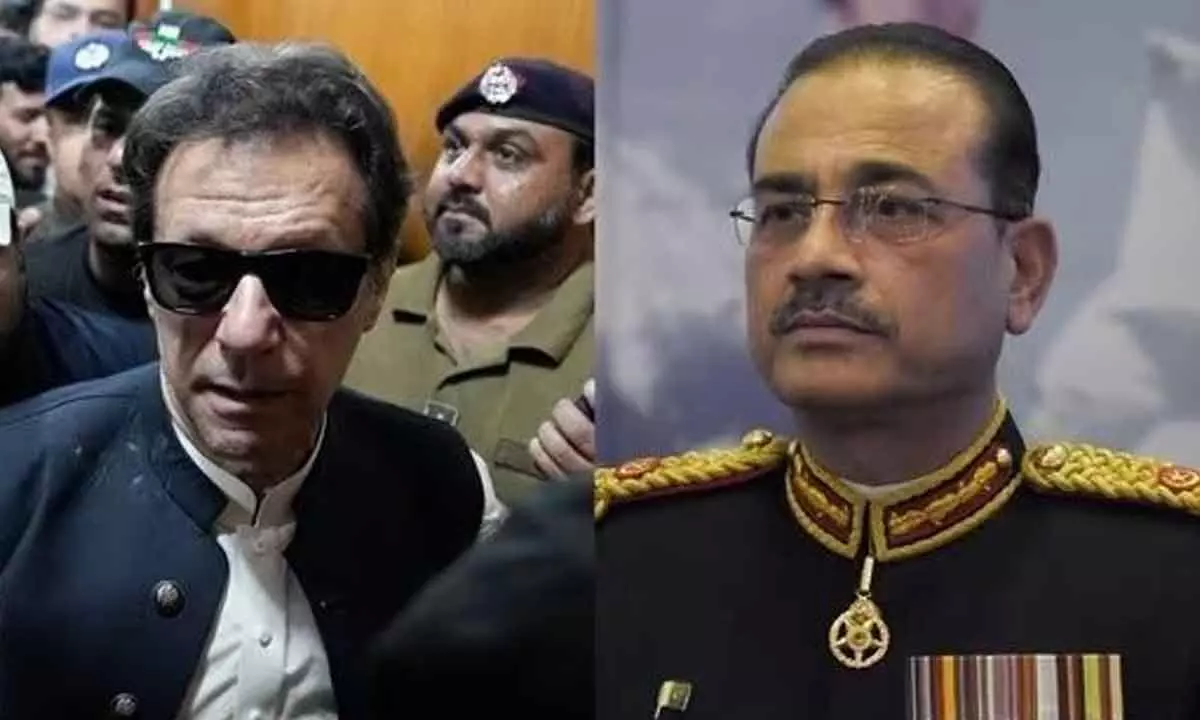Let the political musical chair begin! - Pakistan Army
With Pakistan preparing for its vital February 8 election, the complicated blend of politics, military influence, and internal conflicts and splits adds complexity to the story. The incoming Prime Minister confronts varied challenges, and the people's acceptance of the election's outcome will determine Pakistan's survival as a State
image for illustrative purpose

The ousting of Imran Khan and party key leaders, including former senior Minister Shah Mehmood Qureshi, clears the way for PML-N to emerge as the single largest party that shall return it to power
As Pakistan is all set to elect—or, as some commenters claim, select—the members for the 16th National Assembly, the political landscape is at a critical juncture marked by domestic uncertainties and strategic political manoeuvring. The prominent political contenders in the upcoming elections are the Pakistan Muslim League (N) (PML-N), headed by former Prime Minister Nawaz Sharif, and the Pakistan Peoples Party (PPP), led by former Foreign Minister Bilawal Bhutto Zardari. The Pakistan Tehreek-e-Insaf, which held the status of the largest party in the preceding elections, is presenting its candidates as Independents due to a controversial Supreme Court decision revoking their electoral symbol BAT in the poll lead-up.
The apprehension that the Army has already selected the 24th Prime Minister raises questions about the establishment's control over the political process and the nation. Amidst the political turbulence, according to reports, Imran Khan's party, the Pakistan Tehreek-e-Insaf (PTI), still holds considerable sway, particularly among the youth. Despite Imran Khan and other prominent PTI leaders' recent imprisonment and legal troubles, the party's grassroots level support remains intact, though in disarray due to a lack of visible leadership.
Khan is embroiled in more than 180 legal cases ranging from inciting people to violence after his arrest in May 2023, leaking official secrets, and corruption. A Pakistani court convicted and sentenced former Prime Minister Imran Khan and his wife to seven years in prison on a charge that their 2018 marriage violated Sharia law. The question arises as to whether the sympathy generated due to Khan's arrest will translate into votes for Tehreek-e-Insaf candidates who are contesting as independent candidates. Not leaving anything to chance, the Pakistani establishment has taken extensive measures to ensure a smooth path for PML-N leader Nawaz Sharif's return, including denying the PTI its renowned BAT insignia, disqualifying its members, confiscating papers, and allegedly kidnapping certain leaders.
The Washington Post, in its piece on Pakistan elections, quoting Pakistan's Independent Human Rights Commission, stated that the lead-up to the election had been characterised by "overt, forceful, and unapologetic efforts to manipulate" the outcome.
The ongoing political instability, security challenges, and economic crisis have turned this election extremely dangerous. The inclination of Pakistani youth towards the PTI, as evidenced in discussions between Pakistani commentators, YouTubers, and individuals on the ground, introduces an element of unpredictability to the electoral terrain. Should the outcome fail to garner acceptance from either the establishment or PTI, it could pave the way for another round of unrest, and that could sow seeds for the fragmentation of Pakistan.
The ousting of Imran Khan and party key leaders, including former senior Minister Shah Mehmood Qureshi, clears the way for PML-N to emerge as the single largest party that shall return it to power.
Challenges for the incoming Prime Minister
Regardless of the election outcome, the incoming Prime Minister's challenges are multifaceted. Pakistan's new leader will face multiple litmus tests - beyond the complicatedness of power dynamics and political manoeuvring; the new premier must grapple with economic crises, strained international relations, and internal conflicts. However, the most difficult test is to keep a continued show of loyalty to his master within Pakistan's powerful establishment, and on this front, failure is not an option.
The influence of the Army, often referred to as the establishment, remains a critical factor in shaping Pakistan's political landscape. The proximity of leaders to the military holds significant weight, and the Army's blessing is crucial for any Prime Minister's stability. The delicate dance between civilian and military leadership will determine the nation's political trajectory for the next five years.
Political musical chairs
The game of political musical chair is a familiar scenario for Pakistanis who have witnessed their Army, which is proficient at political power management with turncoats, set the political narrative.
Since 2019, Nawaz Sharif has been in self-imposed exile in London for medical treatment, facing court charges and a lifetime election ban. Only in Pakistan can a former Prime Minister return from exile to re-enter the political fray while another finds himself behind bars. Now, after four years, Sharif eyes a fourth term.
Where does this leave Imran Khan? The all-powerful Pakistani establishment requires at least two players for their game of political musical chair, and it is willing to pardon past transgressions. Thus, there's hope for Imran Khan. If he can reconcile with the Pakistani Army, he can be assured of securing his place in the corridors of power in the next term, which might be sooner than later.
With Pakistan poised for election on February 8, the complicated interplay of political dynamics, military influence, and internal challenges adds intricate layers to the unfolding story. The incoming Prime Minister will confront extensive challenges, ranging from economic crises to diplomatic difficulties and the indispensable necessity for the Army's backing. How the nation reacts to the election results will determine Pakistan's survivability.
(The author is Founder of My Startup TV)

